Article by Toby Böhmer
Editing by Daniel Schuster
If you are interested in translating this article, please reach out to us via JudgeApps or Discord.
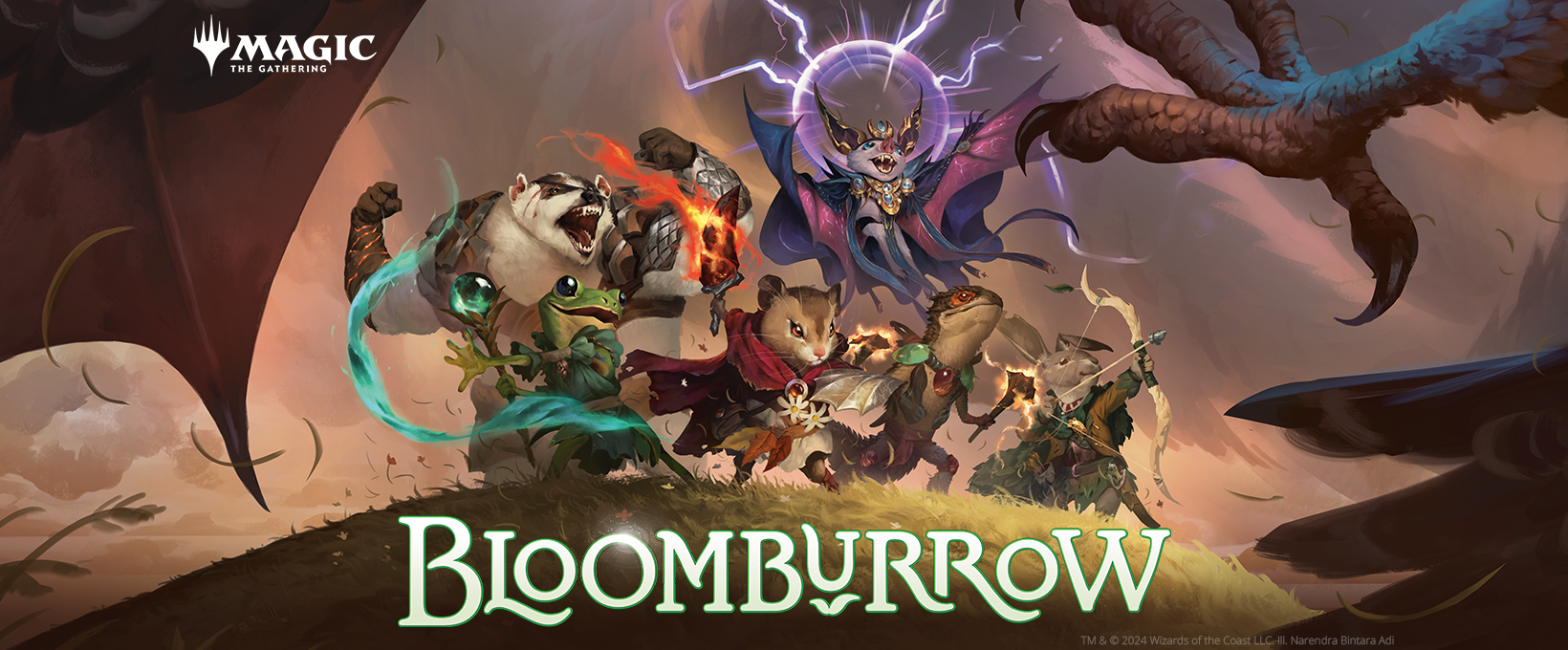
Intro
Magic is rapidly moving forward and releases Bloomburrow on August 2nd, it’s the 7th set of the year, the 3rd premier set. This set is full of very cute animals. There are no humans on this plane, visitors are transformed into anthropomorphic animals.
This article will explain all the new things Bloomburrow brings to Magic and how they work in the rules.
What’s in the Bloomburrow release?
The Bloomburrow release consists of two releases: the Premier Set (set code “BLB”) which will be Standard legal and the Commander Set (4 preconstructed decks, set code “BLC”) which will be legal in Commander, Legacy and Vintage.
Play Booster
The main set will be released in Play Boosters. They are a lot simpler than the ones from the previous set Outlaws of Thunder Junction.
In Play Boosters “Special Guest” cards can replace a common with a probability of 1.5%. “Special Guest” cards are a returning feature. They consist of reprints with new artworks and treatments, but that does not change anything about their legality in any format.
For more details about boosters and their contents see the Collecting Bloomburrow article.
Starter Kits Return
Starter Kits return with this release. A Starter Kit contains two 60-card preconstructed decks. 100% of the cards in a Starter Kit are Standard legal. They contain some mechanically unique cards that can not be found in Play Boosters.
Value Booster
After merging Draft Boosters and Set Boosters to Play Boosters Wizard releases a new type of Booster: Value Boosters.
They contain mostly commons and uncommons and do not guarantee anything beyond that. They will be in some types of stores which are not WPN stores.
New Rules Templates
There are a few rules text template changes in this set.
“Enters the battlefield” becomes just “enters”
The “enters the battlefield” in triggered abilities like “Whenever ~ enters the battlefield …” gets a new template. The new template “Whenever ~ enters …” is much shorter. It is used whenever it is possible. Some cards will still use the longer template if it is important to understand what the card is doing.
Here is an example of a card with the new template:
“CARDNAME” becomes “this creature”
Some creatures reference themselves now with “this creature” in their rules text instead of with their full card name. That seems to be the case with cards with the Offspring” mechanic. On older cards this template was usually used when it gave an ability to a creature.
Here is an example with the new template:
Main phases get renamed
Cards referencing main phases no longer use the words “precombat main phase” or “postcombat main phase” anymore. The new template is “first main phase” and “second main phase”. This is mostly just a template change, but some cards will get a functional errata to work with this change, mostly in the case of additional main phases.
Examples of the new names on cards:
Some Shortening
There is one card, Uncharted Haven, which has a new template for its two replacement effects as it enters the battlefield. They are now combined into one paragraph instead of two and use a much shorter wording. This is not a functional change, they are still two distinct replacement effects, as Matt Tabak and Jess Dunks point out.
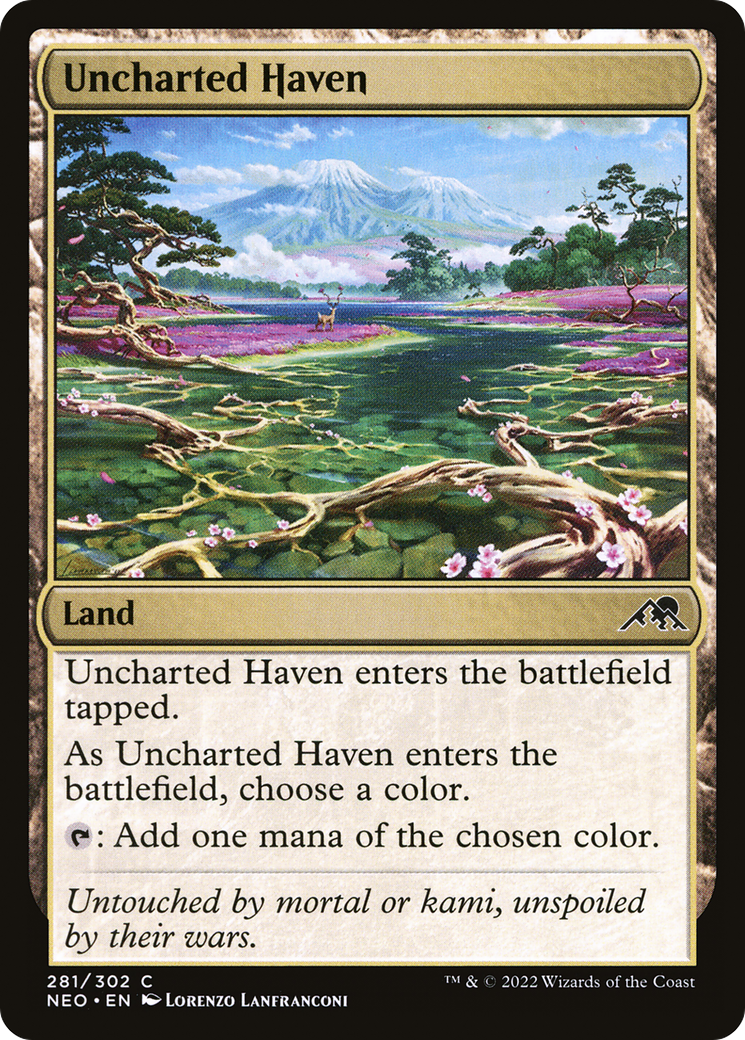
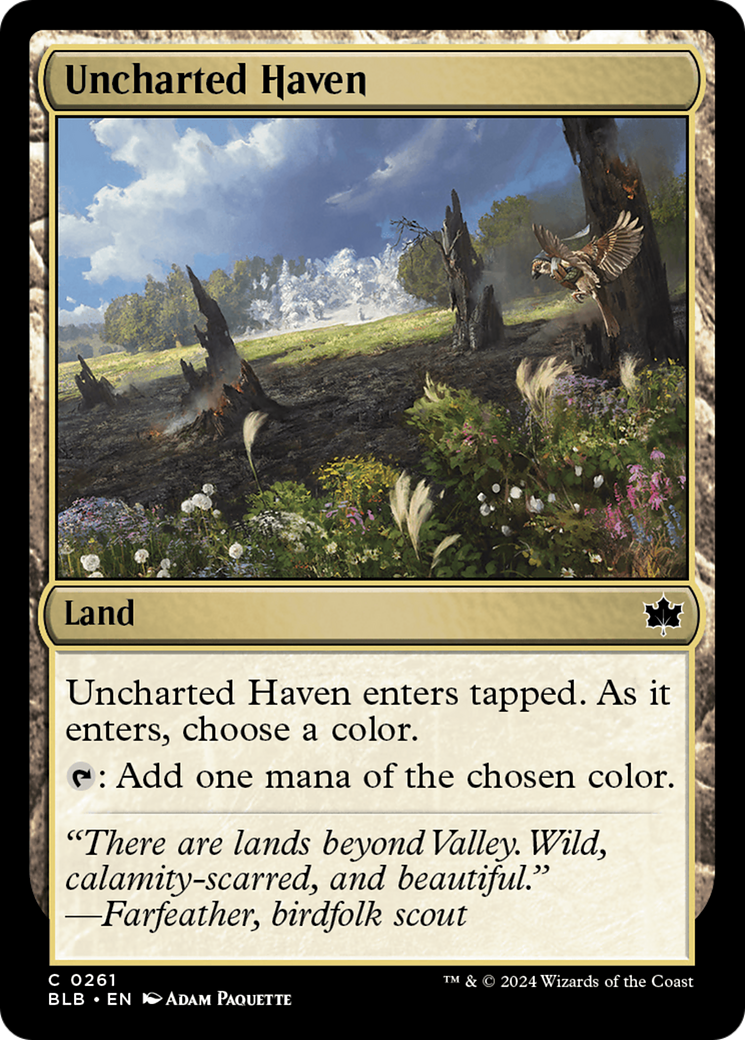
New Mechanics
Offspring
Offspring is a mechanic that lets you create baby versions of the creature it’s on. Offspring is an additional cost you can choose to pay while casting the spell. You can only pay it once. When the creature spell resolves and if you paid the Offspring cost a triggered ability triggers with the creature as its source. Once that trigger resolves you create a copy of the creature, except it’s 1/1. If the creature has already left the battlefield when the trigger resolves, the copy is still created with the appropriate characteristics, except it’s 1/1.
For each such baby version you can get the correct token in Play Boosters. Remember that tokens that are copies of a card retain their mana cost and everything derived from that. On the tokens in the set this is mentioned on the bottom of the card in reminder text, not on the top right of the card, where the mana cost usually lives.
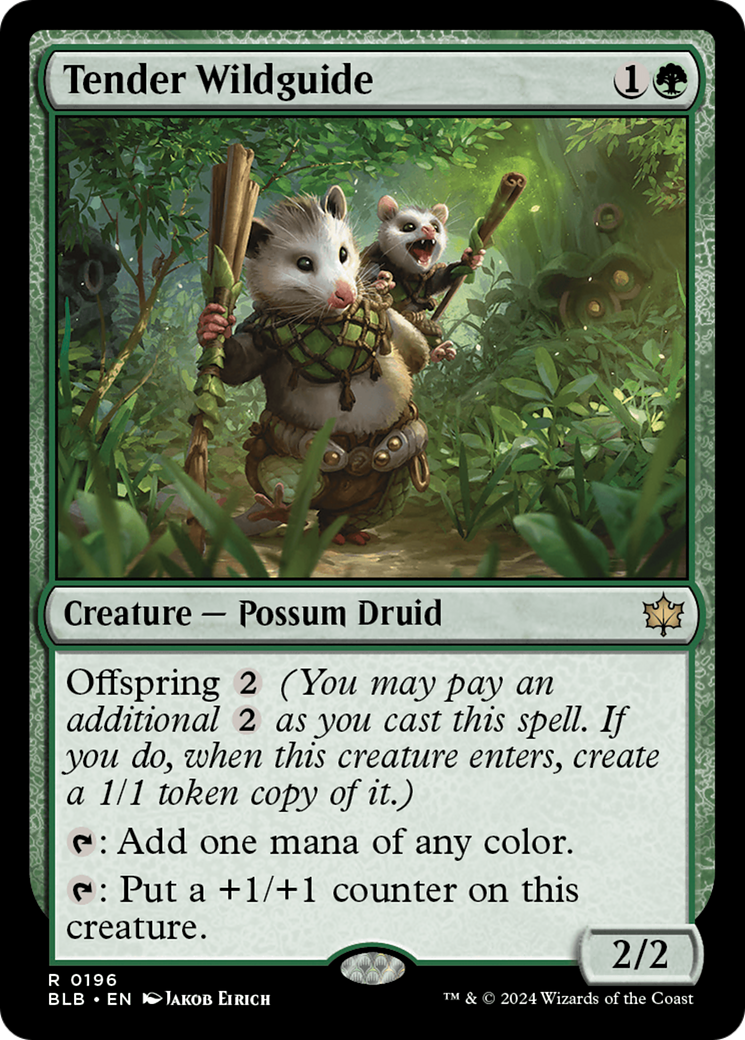
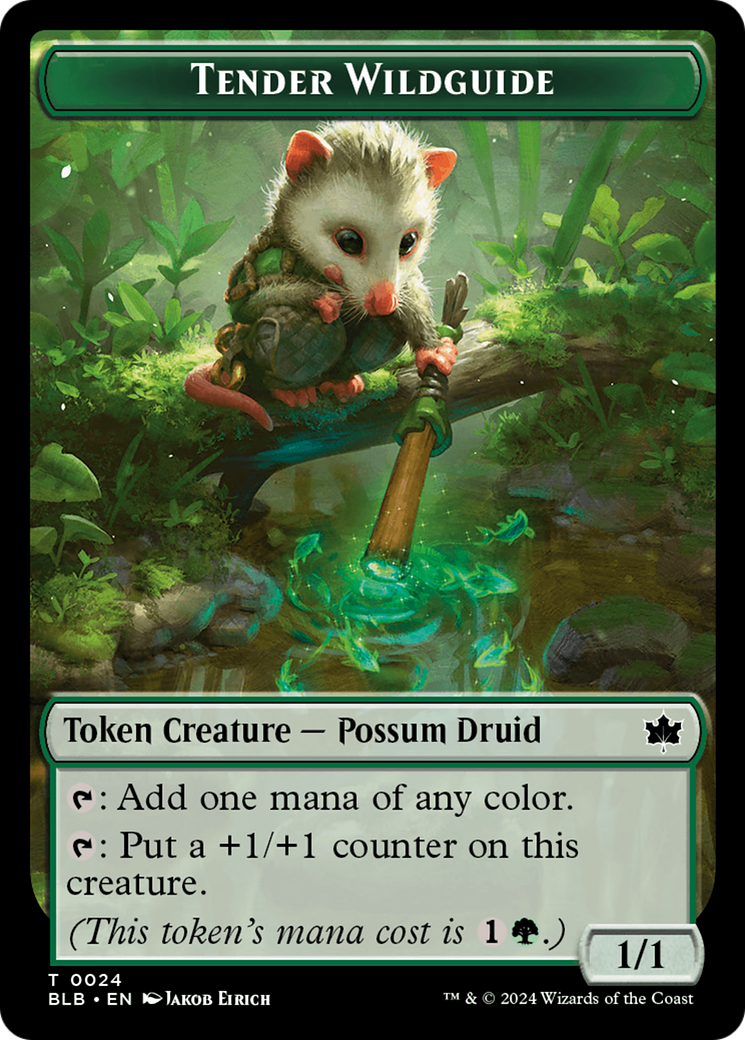
Gift
Gift is a mechanic that allows you to promise an opponent a gift and you get a more powerful spell in return. That usually happens when the spell resolves. The promise must be kept to make that happen, though.
General
The gift is written as “Gift a SOMETHING” on cards and describes what you are promising. Most of the cards are gifting cards or small tokens.
Promising to gift an opponent something is an optional additional cost. The “cost” is giving the promise. There are no other costs attached to it like mana costs or life or whatever. If you are in a multiplayer game you have to choose one of your opponents. You can’t choose a team mate. That chosen player will receive the promised gift later.
How the gifting works is different for permanent spells and instants and sorceries.
Permanents
For permanent spells it works like this: a trigger is put on the stack once the spell has resolved. All players can react to that trigger as usual, it’s the same as every other triggered ability. Once that trigger resolves the chosen opponent receives the promised gift.
Instants/Sorceries
For instants and sorceries it works differently. The spell gets an additional effect. That effect happens before all the other effects that spell would have once it resolves. That effect is effectively (pun intended) the effect #0 of the spell. That effect gives the promised gift to the chosen opponent.
After that all the other effects of the spell happen in their written order, as usual.
Forage
“Forage” is a keyword action. It shows up as a cost that spells and abilities can have. To forage you have to either:
- Exile 3 cards from your graveyard
- Or sacrifice a food
Cards can also react to you foraging. “Whenever you forage” for example means explicitly that you paid a forage cost a spell or ability told you to pay. It will not trigger if you exile 3 cards from your graveyard or sacrifice a food for any other effect.
Valiant
Valiant is an ability word. It marks triggered abilities that reads “Whenever ~ becomes the target of a spell or ability you control for the first time each turn …” which is a mouthful. It’s somewhat a sibling to Heroic, but not the same.
Expend
Expend is a new rules term that tracks how much mana you’ve spent to cast spells over the course of the turn. It shows up as “Expend N” which means it’s looking for the N-th mana you actually paid for a spell this turn. The numbers for N in this set are typically 4 or 8.
There are some details to look out for:
- Only mana that was actually spent counts towards N, so for example if your spell has any cost reduction effects like Affinity or Undaunted or you chose to use payment methods like Delve, Improvise or Convoke to pay for your spells it makes it harder to reach N
- All mana you pay for a spell counts, not only for the mana cost in the top right corner. So additional costs are counted as well as alternative costs
- The N-th mana you pay can only be done once per turn, it is not “every N-th mana”
- The permanent with the Expend ability needs to be on the battlefield to see you spend the N-th mana. That also means it can not see you spend the mana for itself if you have to spend the 4th mana this turn for that permanent spell.
- It doesn’t matter what happens with the spell after you paid for it. The spent mana has been spent and has been seen.
Pawprints
The set has a cycle of five mono-colored sorceries at Mythic. They are all modal spells. They use pawprints as a way to pay for their modes. Pawprints are a new symbol used exclusively for those cards. They aren’t a resource like mana or energy. You can’t save them or carry them over from one spell to the next. The spells are completely self-contained in terms of pawprints.
All those five cards have three modes, one that costs one, one that costs two, and one that costs three pawprints. Since you can choose each mode more than once every combination that has a total pawprint cost of 5 or lower works.
Returning Mechanics
There are also some returning mechanics in the set. For some time now they bring back more mechanics on some cards that are not evergreen or deciduous mechanics. Some on only one card, which is called a cameo.
But there are some returning mechanics that are on a good handful of cards.
Classes
Classes were introduced in AFR. Now they are back! Each class represents a talent.
A short summary of classes:
- They’re Enchantments, class is an enchantment subtype
- They have levels, starting at level 1
- You can level-up any time you could cast a sorcery
- The class gets the respective class-ability in addition to all its other abilities it already has
Threshold
Except for two cards in two Modern Horizons sets and one from an unset this is the first return of the Threshold mechanic since its introduction in Odyssey block back in the old days.
Abilities marked by the Threshold ability word count how many cards you have in your graveyard. If you have 7 or more, the ability is in effect, can be activated or does more, depending on what it is.
New Predefined Tokens
This set brings a few new predefined tokens. They show up as a gift in the Gift mechanic, probably because there was not a lot of room or the description of the gift would have been too long.
Specific Cards
Here are some cards from the set and what I think is interesting about them or might catch you or players off guard, particularly at prerelease events.
- Calamitous Tide can have 0, 1 or 2 targets. So beware of those targets to still be legal when this spell is about to resolve so you can draw cards.
- Early Winter’s second mode targets the opponent, not the enchantment. So the opponent chooses which one needs to go. If they only have one no form of protection or hexproof/ or shroud if you’re playing an eternal formatshroud that enchantment may have can prevent its fate.
- Mind Spiral is an example of how promising a Gift may change how the spell works. If you promised the Gift the spell has one more target than if you don’t. So this also gives you a hint where in “Casting a Spell” the promise must be made (before choosing targets).
- Wishing Well’s activated ability has a reflexive trigger. Even though it might look like a separate trigger when looking at the formatting of the text on the card, this is not a standalone trigger. It triggers when you successfully put a coin on the well. There are multiple reflexive triggers in the set. A little more than I saw in previous sets.
- Starlit Soothsayer is the obligatory reminder to always look out for intervening-if conditions in your triggers!
- Three Tree Scribe introduces a new combination of words in trigger conditions: “leaves the battlefield without dying”. This is the first time this template is used on any card. It should be very intuitive what it does, though. Any “leaves the battlefield” which is not the creature going to the graveyard should suffice.
- Heirloom Epic has probably the cutest card art I have ever seen. I love it! Besides that its activated ability has what one could call “Convoke for activated abilities”.
- Maha, Its Feathers Night’s continuous effect sets only the toughness of your opponents creatures to 1, not their power! This is the first card outside of an unset to do that. All other similar effects to date also set the power, too.
- Sunspine Lynx’s second ability can stop a card in the Modern format that’s very popular right now from working properly: The One Ring. CR 101.2 says if an effect says something (preventing damage) can’t happen this takes precedence over effects that say it can (The One Ring’s “protection from everything”). So you can deal damage through The One Ring protection with this card on the battlefield.
Thank you for reading and I hope you have a lot of fun with all those cute cards at Bloomburrow events all over the world. I hope you learned something useful 🙂
